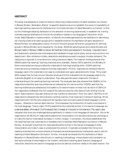| dc.description.abstract | The study was designed to study the factors influencing implementation of adult education curriculum in Mwala Division, Machakos District. Its specific objectives were to establish the extent of availability of learning!teaching resources for facilitators for the implementation of Adult Education curriculum, to find out the challenges faced by facilitators in the selection of learning experiences, to establish the training methods used by facilitators to find out the problems related to the language of instruction which hinder Adult Education implementation; to identify the challenges faced by the facilitators in identifying the training needs of all adult groups and to establish whether the facilitators of adult education in Mwala Division are adequately trained. A total of 78 youth groups, 68 women groups and 61 self help groups in Mwala Division were targeted for the study. Stratified sampling was done using Krenjcie and Morgan table in Mulusa (1988) to obtain 44 facilitators who participated in the study. A questionnaire and observation schedule were developed and validated through a pilot study and by lecturers from the department. After collection of data, descriptive statistics was used to analyze the data collected. The results were reported in a narrative form using a series of tables. The research findings showed that 30(90%) said that teaching! learning materials were available. Sixteen (40%) said that the Ministry of Culture and social services provided the materials for learning/teaching while 12(30%) said that materials were provided by nongovernmental organization. Further, respondents indicated that the language used in the materials is not easy to understand and gave explanations for these. Thirty eight (95%) stated that the learners are illiterate whereas 2 (5.0%) indicated that the language used in the materials (English) is not easy to understand. They also gave the same reasons for the lack of understanding of the teaching/learning materials. The analyzed data also showed that 24(60%) of the respondents said that learning incidences are selected by the learners while 12(30%) said that the learning incidences are selected by the teachers. On determination of what is to be learnt 21(52%) of the respondents indicated that the needs of the learners was the main determinant of what is to be learnt. Demonstration was also cited as the key method of instruction. From the report, 29(72%) of the respondents indicated that demonstration method was the most important method of teaching. All the respondents 44 (100.0%) who answered the questionnaire correctly used the local language (mother tongue) - Kikamba to instruct adult learners. This is because the construction of reality is contained in the local language. Twenty eight (70.0%) stated that the materials written in the learner's language are understandable, whereas 6 (15.0%) stated that it is easy to interpret to the learners. The report also indicated that there are challenges facing facilitators in relation to the language of instruction. Out of 44 respondents, 26 (65.0%) of respondents states that interpretation of materials was the key challenge is to make the learner understand concepts in mother-tongue. In conclusion, the study established that the teaching/learning materials are a necessary tool to facilitate Adult Education curriculum in Mwala Division. It was also noted that the materials should be written in the learner's language to help interpretation and make it easy to understand the content. It was also concluded that the correct teaching methods that involves a blend of interactional and presentational methods be used to aid the teaching of Adult Education Curriculum. Further, the study concludes that the facilitators of Adult Education in Mwala Division should train on teaching methodology, interpretation and translation as well as be a breast of knowledge on the modem methods of teaching adult learners. Language of instruction should be the learner's language so as to be able to construct reality to the adult learner. The following recommendations were made: 1. In spite of the high number of youth/adult groups in Mwala Division, there is need to ensure that the teaching learning materials are written in the local language to ease readability and translation. 2. Facilitators of Adult Education curriculum should be trained and retrained to be abreast, of the knowledge of Adult Education learner needs, methodology and hence put this into practice. 3. The study recommends that the facilitators should use the most effective teaching method that helps boost morale of learners as well as create interest in the Adult Education curriculum practice. | en |

